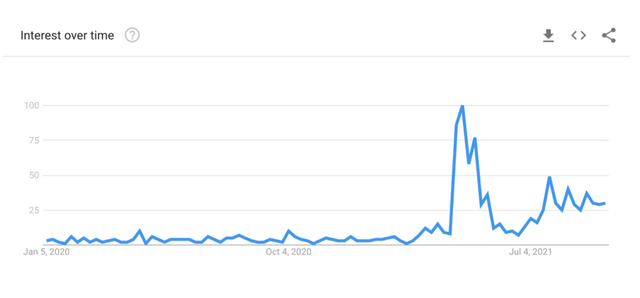Into the Metaverse: A New Era of Digital Interaction

Introduction
You can’t stop the future. It will come regardless of whether we want it to or not. We can however direct it in a way that aligns with our values, vision, and imagination. The concept of a metaverse has been around for decades but only in the past few years has this concept evolved with real-world projects launching their renditions of it.
Wikipedia defines a metaverse as a hypothesized iteration of the Internet, supporting persistent online 3-D virtual environments through conventional personal computing, as well as virtual and augmented reality headsets.
In reality, the “metaverse” is a convergence of our physical and digital lives being brought on by advancements in internet connectivity, AR/VR, and blockchain. A culmination of science fiction fantasies — an evolution brought about by popular titles such as ‘Tron’ and ‘Ready Player One’ taking place right now.
The question must be asked, why must humanity go beyond its own natural universe and physical world in a pursuit to create digital replications? Perhaps it is because human beings have a drive within themselves to explore the unexplored and create what was never imagined or attempted before. Why wouldn’t they create a metaverse, or several metaverses perhaps connecting someday into a single all-encompassing megaverse?
The word metaverse is a portmanteau of the Greek term Meta and the English word universe. Meta in Greek is popularly used as a prefix to mean after or beyond. The word metaverse literally means a universe beyond.
Looking into the history of the word’s use, most will find that it first gained notoriety in Neal Stephenson’s 1992 novel, Snow Crash.
The protagonist in the novel moves in and out of a place called the metaverse, a small-scale urban landscape existing as code where users have lifelike experiences.
The dynamics of Stephenson’s metaverse have remained constant for the most part:
- Three-dimensional
- A metaphor for the real-world
- A shared virtual space
- Accessible using goggles, much like today’s VR headsets
- Presented in a first-person perspective
- The use of avatars to interact in a digital environment
Transformational sci-fi ideas often take time to develop from concept to reality and the concept of the metaverse was no different. It had a subtle but yet profound impact on the creative psyche of human collective consciousness, slowly gaining momentum in the background.
It wasn’t until 2011 that it really broke out into the mainstream as it received major attention in Ernest Cline’s novel “Ready Player One,” followed by the full feature film debut in 2018.
The “Ready Player One” metaverse was built with familiar intellectual property and run as a business that helped its users escape a dystopian offline world. As a result, it had consumed, transformed, and or virtualized most offline businesses.
While Stephenson’s metaverse was a digital utopia that had been infested by hackers, Cline’s was only critically negative of the metaverse concept when capitalism came into the picture, corrupting everything it touched.
Monetizing the Metaverse
The concept of the metaverse is a natural progression and explored the integration of industries such as e-sports and MMOG (massively multiplayer online games) titles like Fortnight, Everquest, World of Warcraft, and more.
The potential for industry expansion is huge. This is easy to see, take Fortnite as an example. It has seen exponential growth since its debut in the summer of 2017. Now with 350 million players monthly it has become one of the most highly subscribed games of all time logging over 3.2 billion hours of gameplay as of April 2021.
In this day and age with an overwhelming amount of information at our fingertips, a new and highly prized resource is coveted above all else, that resource is human attention. Major corporations are paying major attention to Fortnight and its offspring with hopes of capitalizing on the emerging industry of MMOG in conjunction with metaverse applications. Furthermore, additional research has been conducted indicating that gamers don’t age out of playing; rather it appears this phenomenon results in a lifetime of similar behavior.
Non Fungible Tokens
It is important to note that over 400 million dollars have been spent purchasing non-fungible tokens (NFTs) in conjunction with various metaverse projects. Beyond that, an additional 40 million dollars of trading volume take place monthly as these NFTs move from owner to owner.
Furthermore, the most expensive NFT transactions in history have occurred just within the last few months. One clear example of exponential growth in the industry can be seen by Christie’s auctioning off a piece of digital art by Beeple via NFT that sold for more than $69 million in late 2021.
Digital real estate sales are one of the biggest revenue sources for metaverse projects generating millions of dollars annually. One of the first companies to take part in digital real estate sales is Metaverse Group, the operator of a virtual world called Decentraland.
In November 2021, Metaverse Group’s parent company, Token.com, announced a “116 parcel estate in the heart of the Fashion Street district within Decentraland” in a $2.5 million deal settled in the digital cryptocurrency MANA — a new world record! The new owner of this estate near Fashion Street may be able to profit from this purchase if a famous brand decides to open a store there: The owner would essentially become that brand’s virtual landlord.
Beyond digital real estate sales, additional NFT revenue generation can be made through sales of avatars, wearables, in-game vehicles, and more. The potential for digital asset sales inside a metaverse is almost unlimited.
Metaverse Advertising
According to reputable sources, the global advertising market reached a value of US$ 647 Billion in 2020 and this number is predicted to have grown significantly as of end of year 2021. Metaverse advertising is going to be a huge growth industry going forward as projects will look to monetize their digital real estate venues through the sale of advertising and sponsorship opportunities.
Digital billboards, in-screen advertising on digital transporters, concerts and special events, the list of possible advertising opportunities is endless.
The concept of the Metaverse has gained an intense amount of interest in 2021.
Check out the Google Trends data for the search term metaverse since the beginning of 2020:

Source: Google Trends
With interest in the metaverse growing at a rapid pace, companies are looking to take advantage of this new and emerging trend placing key advertisements in flagship projects to gain access to a new emerging key demographic.
The Metaverse presents an entirely new vector for advertisers and marketers to reach their audience. Brands need to begin considering how the Metaverse may unfold so they can take part in the construction of this new reality.
In-game advertising has been around for decades and is a commonly used term in advertising. The concept could refer to a banner ad in Candy Crush or an interstitial unit in Clash of Clans. Companies and corporations are comfortable with this form of advertising as it has had dramatic results in generating significant sales revenue.
The metaverse brings a whole new concept of “in-world advertising” relating to ads that appear in a virtual world. In many cases, these ads mirror real-world out-of-home (OOH) ads.
Speeding down the road on virtual city streets in a racing game you look up to see big neon virtual billboards displaying ads for real-world products, this is where advertising decisions are going, companies will have to adjust and deploy advertising budgets towards the metaverse.
Special Events in the Metaverse
Hosting special events in the metaverse is another huge source of revenue for developers looking to capitalize and find new and exciting sources of funding for their projects. In the real world, special events are limited to the capacity of the venue in which they are hosted. According to Rod Stewart, the highest attended concert in history at Copacabana Beach on New Year’s Eve was in 1994, with over 3.5 million attendees.
Looking at a more recent event, the popular rap artist Travis Scott more than tripled this number of attendees with over 12.3 million concurrent players attending his Astronomical event in Fortnite.
The potential for artists to take advantage of metaverse projects to host their virtual concerts is immense but it isn’t the only way to monetize special events in the metaverse. In recent news, media companies have been utilizing similar captive events to market new movies. Fortnite hosted a Star Wars film preview event which included a live discussion with director JJ Abrams and a screening of a previously unreleased scene from The Rise of Skywalker.
The potential for monetizing special events in the metaverse is huge.
Conclusion
The metaverse is a concept that has significant real-world applications deployed and in development at this very moment. Of course, living in a digital world is no substitute for the real thing. I foresee a future in which the real world and the digital world operate alongside each other at least for the next few decades, beyond that the line between the two may become blurry.
Will consumers flock to the metaverse to do all their transacting? Probably not — recent data indicates there is a lot to be said for the real world given the excitement of consumers rushing back to it.
It may become a premium venue for accessing goods and services or special events where being there wouldn’t really be an opportunity. It is hard to argue that the metaverse isn’t gaining ground with consumers and innovators. Simply put, it is a huge opportunity for anyone who deems to participate in its early-stage growth and development.
Authored by @techblogger
About Gamestate
Gamestate is a megaverse nexus, uniting gamers, fans, developers, creators, and merchants in a place of fun, discovery, and learning. Gamestate offers sales channels for games, apps, advertising, gaming equipment, music, media, and general merchandise as well as a Rocket Launchpad accelerator for indie game startups.
U-State unified profiles solve the problem of fragmented gaming accounts and achievements; allowing gamers to create and import their existing game profiles and leaderboard ranks, collated into a single portable, immutable, privacy-centric, achievements-based blockchain digital identity profile for ultimate flexing and bragging rights!
Website: https://gamestate.one
Discord: https://discord.gamestate.one
Telegram: https://t.me/GamestateOfficial
Twitter: https://twitter.com/Gamestate_one
Source Citation:
https://en.wikipedia.org/wiki/Metaverse
https://www.xrtoday.com/virtual-reality/unpacking-meta-where-did-the-word-metaverse-come-from/
https://medium.com/ipg-media-lab/part-1-how-covid-19-is-pushing-us-closer-to-the-metaverse-c76a46e21cd2
https://www.theverge.com/2020/5/6/21249497/fortnite-350-million-registered-players-hours-played-april
https://www.forbes.com/sites/cathyhackl/2021/03/15/making-money-in-the-metaverse/?sh=1196dab13b43
https://fortune.com/2021/12/03/metaverse-interest-spikes-digital-real-estate-prices/
https://www.vox.com/recode/2021/12/2/22812608/metaverse-real-estate-meta
https://whatsnewinpublishing.com/is-metaverse-advertising-the-next-big-thing/